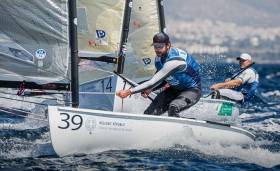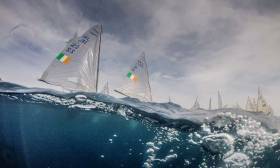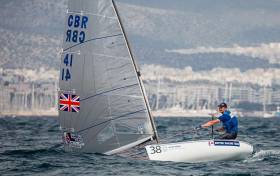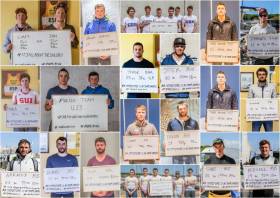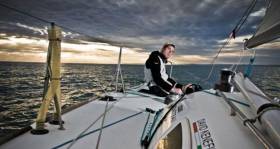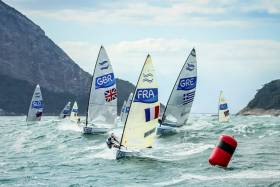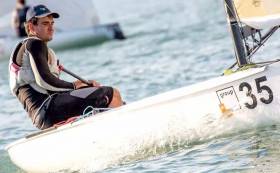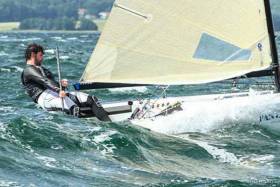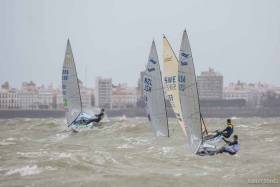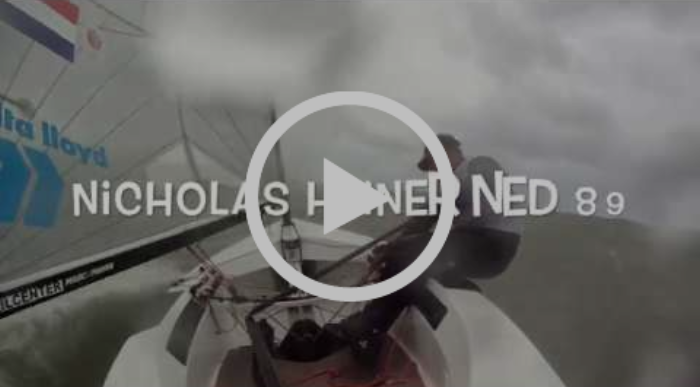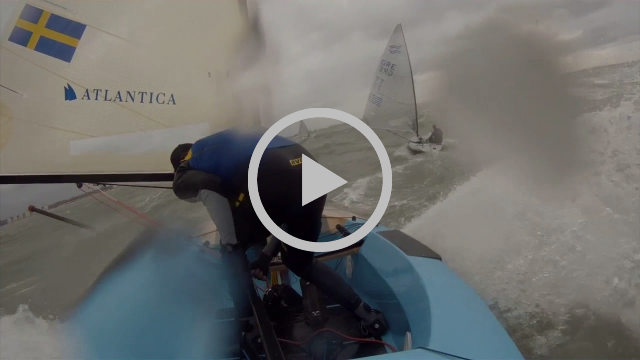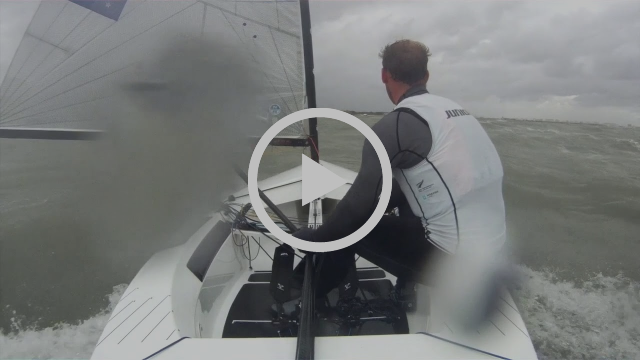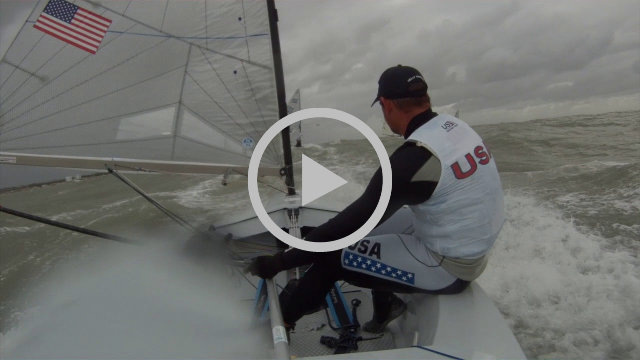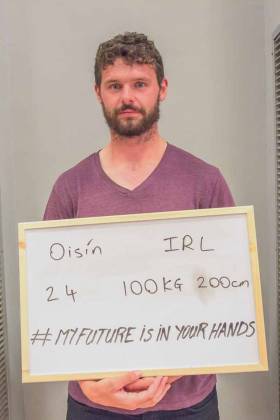Displaying items by tag: Finn
Irish Finn Sailors Sign Open Letter To World Sailing Over Class Removal From Paris 2024
Fionn Lyden and Oisin McClelland — who are currently competing at the Finn Europeans in Athens — are among dozens of concerned Finn sailors who have put their names to an open letter to sailing chiefs over the removal of their class from the 2024 Olympic Games in Paris.
The letter’s release coincides with the start of World Sailing’s Mid-Year Meeting in London today (Friday 17 May), and follows a similar appeal by the International Finn Association ahead of the AGM for sailing’s world governing body last November.
That was prompted by an 11th-hour move by World Sailing decision makers to replace the Mixed One Person Dinghy event (in which men sail the Finn class) with a two-person keelboat class to be determined, overturning a previous decision in May 2018.
In its statement at the time, the Finn class body said the decision “is further driving our sport into expensive elitist Olympic events which will result in the decrease of universality and participation in Olympic sailing”.
The latest letter, from a group providing the email address [email protected], is attached below, and the text can be read here:
To whom it may concern,
We are writing to express our deep concern regarding the removal of the Finn class from the 2024 Olympic Games by World Sailing and to request the reinstatement of a class suited to male athletes over 85 kilograms.
While we understand that the main reason behind this decision was to give preference to mixed event categories, removing the Finn class eliminates a massive Olympic sailing group which includes every single male athlete over 85 kilograms. Historically, athletes of this category have significantly contributed to the sport and this category’s popularity continues today. At the recent Aarhus Sailing World Championships in Denmark, 42 nations gathered and participated with athletes in the Finn class, making the Finn the third largest class at the competition.
Not only is the Finn class’s popularity undeniable and the removal of this class a detriment to the Olympic Games, but it also discriminates against many sailors. Despite the initial working party and the World Sailing Events Committee Chairman’s expressed respect for World Sailing’s Regulation 23 and the ‘all physique’s’ policy 70/17, the category of men over 85 kilograms has been discriminated against and effectively barred from competition due to the equipment specifications. For further evidence of this detrimental phenomenon, please see page 17 of the attached document, which illustrates that all male sailors fall into the 70-85 kilogram bracket.
The removal of the Finn class from the Olympic Games breaches World Sailing rules and policies and disregards the principles of the Olympic Charter with respect to non-discrimination of physiques, and limits access to many sailors. Therefore, we urge you to reinstate a class, like the Finn, suited to male athletes over 85 kilograms in order to guarantee the fair access to all sailors and in order to avoid the implementation of discriminatory decision from World Sailing.
In the hope that a correction will be provided without the need for further action, we remain at your disposal for a constructive dialogue on this matter at the address shown in the header of this letter.
Injury Worry for Fionn Lyden at Finn Europeans
Oisin McClelland and Fionn Lyden are lying 38th and 39th respectively at the 84-boat Finn Europeans in Athens this week but an injury for Lyden means he is unlikely to finish the regatta.
The Baltimore sailor, who was a 2017 bronze medalist at U23 level in the heavyweight men's dinghy class pulled grip muscles in his right arm leaving the harbour on the first day.
It's a disappointing outcome but none more so than the forecast for the rest of the event is for light winds, conditions that really suit him.
Sydney Olympian Maria Coleman is coaching the Irish pair.
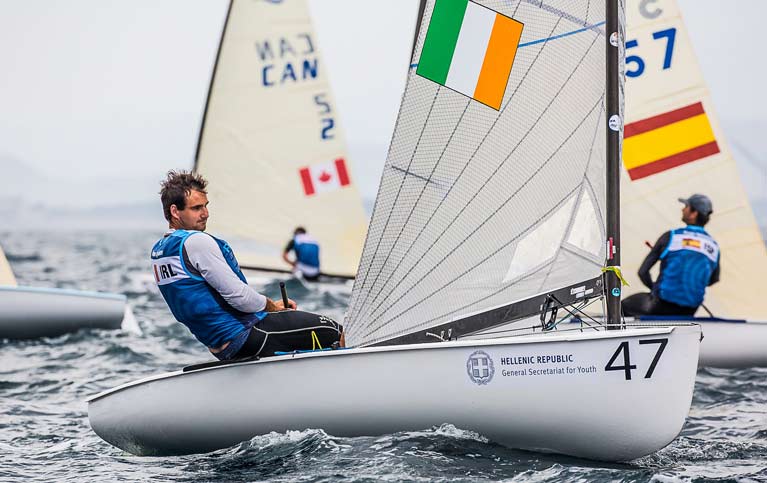 Fionn Lyden Photo: Robert Deaves
Fionn Lyden Photo: Robert Deaves
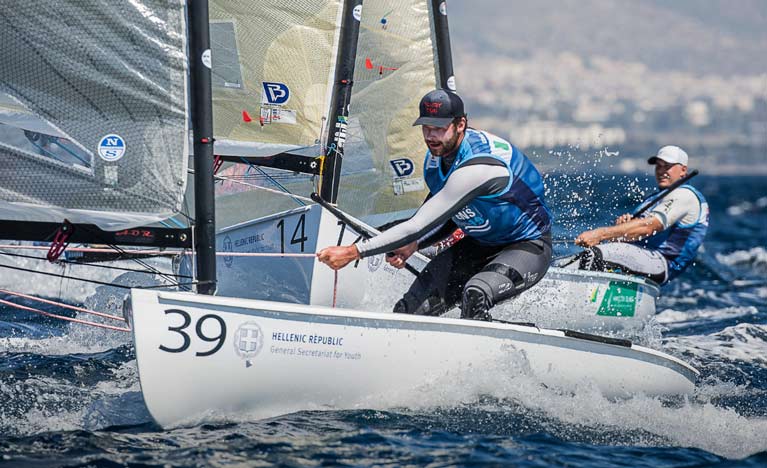 Oisin McClelland Photo: Robert Deaves
Oisin McClelland Photo: Robert Deaves
Giles Scott extends while fight for Tokyo places heats up
The Europeans got back on track on Thursday with three more races completed. After losing the overall lead following the opening race, Brit, Giles Scott ended the day with a 15-point lead over Hungarian world champion Zsombor Berecz. Andy Maloney, from New Zealand drops one place to third, despite winning the opening race. The other race wins went to Nils Theuninck, from Switzerland and Josip Olujic, from Croatia.
The battle to win the four places in Tokyo took a new turn today with only Norway still among the top four nations from yesterday that haven’t already qualified. A great day from Jorge Zarif moves him up to 10th and second nation, just one point behind Anders Pedersen from Norway, while a fantastic performance from Nils Theuninck puts Switzerland in third, with USA fourth.
With three races scheduled it was with a feeling of déjà vue that the fleet was held on shore again with too little wind on the race course. As the wind increased and the fleet was released they managed three races in a range of conditions. The first race started in 7-9 knots. Oscar was raised at the top mark and the wind continued to increase to 12-14 knots over the afternoon before dropping in the middle of the final race to around 5 knots.
Day 4 Highlights
James Skulczuk, from Britain, was fastest to the top mark in Race 6, leading round from Arkadiy Kistanov from Russia and Theuninck. Kistanov took the lead downwind and held it until the second top mark, when Maloney came through to lead into the finish. Kisanov took second and Zarif recovered to take third. Regatta leader, Scott, recovered from the second half of the fleet at the top mark, to cross in 14th, and briefly lost the overall lead to Maloney.
Race 7 started in great conditions, with 12-14 knots, nice waves and brilliant blue skies. After placing fourth in the first race, Theuninck rounded the top mark in the lead and flew downwind to open up a huge gap on the fleet. He never looked threatened, while the pack behind him including Luwen Shen, from China, Ed Wright from Britain, Zarif and Scott were chasing hard. Zarif eventually crossed second with Scott third.
The wind was clearly dropping as the fleet started Race 8, and the course was reduced in size at each mark. Wright was the early leader from Joan Cardona, of Spain, and Max Salminen, from Sweden. The second beat was crucial with lots of pressure changes in the dying breeze causing many place changes. Berecz emerged ahead to lead downwind, but Olujic got the final advantage to lead the fleet across the line from Berecz and Scott.
Zarif said, “I had two pretty good races with a second and a third. The last one was pretty bad when the wind completely died. It’s not an excuse, as I made my discard, but I had a good day, because in a championship like this the scores are super high and if you can make top 12 average you are in a good position to make the medal race.”
“I think I sailed really bad the first two days, but I was still just six points behind fourth place. Everyone has had at least one terrible race, so there is still a lot to play for tomorrow and let’s see if I can make it.”
It has been an up and down week for Cardona, and he is now struggling to be the one to qualify Spain for Tokyo 2020.
“It was not a very good day for me. Yesterday I got a black flag so today it was like I couldn’t discard any bad race. I had a 40th so not the best result and I dropped a bit in the overall, but everything is still open and hoping for better results tomorrow.”
“The conditions were good except the last race when the wind dropped a lot. But conditions were nice and I enjoyed it a lot. It’s my first Olympic qualifier so I am just learning lots of things and trying to improve a bit every day.”
The star performance of the day was undoubtedly Theuninck. The defending U23 European Champion is now leading the U23 championship from Cardona and Finland’s Oskari Muhonen.
“It was really tiring, because the first two races were hard on the upwinds and hard on the downwinds, and long races, so I am really tired right now but also really happy with the day as well.”
“The first two went really well with a fourth and a first and then the last about 13th so it was quite a consistent day.”
“This regatta is the most important of the year. I managed to get back in the game after a not so good first two days. I guess tomorrow, I will try and do the same and see where I end up. It’s been a pretty good year with fifth in Miami and 12th in Palma. So some good results. This regatta didn’t go so well until today, so I am happy that my results are improving.”
“In the last race the wind was dying and I came around the top mark in the top 20 and it was free pumping, even though conditions were really light, so I just pumped as hard as I could to catch up the front pack. And I managed to gain some places. I missed a few opportunities to get some more but it was a bit intense, a bit stressful and nerve-wracking, but it was OK.”
There will be plenty more stress to come with a maximum of three races left to sail. The points are generally high and also quite close, so there is still everything to play for. The top three overall are starting to show signs of pulling away, with a 30-point gap on the fleet, but the medal race split and the Tokyo 2020 qualification is still incredibly tight.
There are two more races in the opening series scheduled on Friday, before the medal race and the final race for the rest on Saturday.
Oisin McClelland in Top Third of Finn Euros
Ireland's Oisin McClelland is 24th and Fionn Lyden is 42nd at the 2019 Finn Open Europeans in Athens following three races on Tuesday.
Giles Scott, from Britain, leads after the first day. Scott won two races and placed third in the other to hold a four-point lead over Andy Maloney, from New Zealand, who won the second race of the day. World champion, Zsombor Berecz, from Hungary, is third overall. Joan Cardona, from Spain, in 11th overall, holds a sizable lead in the U23 European Championship.
Overlooked by the Acropolis of Athens in the distance, the 84 sailors from 33 nations were looking for some Greek wisdom, to prepare themselves for three tough races in challenging conditions, and conquer the Greek winds.
After Monday’s racing was lost with no wind, the fleet was keen to get racing on Tuesday, but there was a further postponement on shore, waiting for wind to build. Finally, at 13.30, the fleet was sent out and enjoyed three great races in a solid breeze, building from 10-12 knots to 15-16 later in the afternoon.
Race 1 got away first time with Anders Pedersen, from Norway, leading round the top mark from Josip Olujic, from Croatia and Scott. Scott took the lead downwind but lost his advantage on the second upwind with Fabian Pic, from France and Alican Kaynar, from Turkey, closing right up on the Olympic champion. However, Scott extended again on the final downwind for a comfortable win from Nenad Bugarin, from Croatia and Kaynar.
The wind looked like it would drop for a while but then came back in at 14-15 knots under clearing skies. The second race took three attempts to get away, but then started cleanly under the black flag. After placing fourth in the opening race, Maloney led all the way in Race 2, rounding the top mark ahead of Brits, Henry Wetherell, and Scott. Maloney sped away from the fleet for the race win, while Berecz moved through to take second from Scott.
The breeze dropped slightly for the third and final race of the day. Maloney was again in the mix, rounding just behind Cardona and just in front of Tapio Nirkko, from Finland. Scott was not far back and moved ahead at the gate, to go on to take his second win of the day. Cardona held on for second, while Maloney crossed on third.
The championship is important to many sailors because it is a nation qualifier for the Tokyo Olympics, with four spots available. One of those if Olujic, who just missed out in Aarhus.
“Happy with my starts, so I am happy with the day and fighting for these four spots left, so I think comparing to the other guys, so far I did well. It’s really important for me, and really important for Croatia. Personally I missed qualifying in Aarhus by six points and one place, I was 11th, so it was kind of painful, but hopefully I learned something from it and I am going to keep fighting and try to do it here.”
Tuesday, “was a really nice day. Nice breeze, so was intense. I don’t know about the other guys but after the World Sailing events, we kind of forgot how it is to race Finns. Having a race over 60 minutes is hard, but it’s nice. You have to work totally different to 50 minutes races to take care of your energy and use it wisely, not spend everything fast, so it’s a totally different approach.”
In second overall, Maloney was on form following his win at the Trofeo Princesa Sofia in April.
“It turned out to be a really nice this afternoon with anywhere from 7-15 knots of breeze with some nice waves. For myself, I had a really good day with three top fives, which is awesome in a big fleet. It was really tricky with a 10-15 degree range out there and quite a lot of pressure came with these shifts, so it was pretty easy to get stuck on the wrong side of things if you weren’t nailing it.”
“Josh [Junior] and I are both here to keep progressing and keep seeing how the things we have been working on are going and figure out what to work on next, ahead of going to Tokyo next month. We are in Tokyo for the next three months for little stints at a time, so that’s the big part of the year, but here we will just be learning as much as we can.”
“With 80 to 90 boats on one start line, it’s massive, so trying to figure out where to start on the line and how you are going to get out of that line on the right tack as soon as possible is pretty tricky. It’s probably the hardest thing of the day. You can get pined pretty easily going the wrong way so I think I did that pretty nicely today.”
Another sailor still looking for a place in Tokyo is Pedersen. “I didn’t qualify in Aarhus so this is really important to hopefully get a nation spot here so I have to fight for that through the week. It’s tough racing, and it’s really tiring. All the guys are flat out for 75 minutes, so that hard and tough for the body for sure.”
“It was good to finally get racing. Three heavy races. I think the boat speed is good and the decision making is good. I felt unlucky to get a yellow flag in the first race when I was leading, so that sucked. I caught some bad air and fell back to 20th so that was not good race, but the last two races were good.”
“The first race was a bit light and we didn’t have free pumping, they shut that off at the top mark, and the wind was very up and down, we got some clouds coming in bringing some more pressure and taking it away so it was a bit of everything.”
Maloney concluded, “I think all the forecasts are a bit varied so it might be a bit lighter for the rest of the week. Today might have been the nicest day of the week, but we’ll see.”
After three races on Tuesday, the event is now just one race behind. Three more races are scheduled for Wednesday, which would bring it back on schedule.
Results after three races
1 GBR 41 Giles Scott 5
2 NZL 61 Andy Maloney 9
3 HUN 40 Zsombor Berecz 15
4 TUR 21 Alican Kaynar 19
5 CRO 1 Josip Olujic 31
6 NOR 1 Anders Pedersen 33
7 FRA 112 Jonathan Lobert 33
8 NZL 24 Josh Junior 41
9 NED 89 Nicholas Heiner 41
10 NED 842 Pieter-Jan Postma 44
Full results here
Special World Sailing Council Meeting Confirms Olympic Keelboat Event Over Finn Class
Minutes of the meeting that decided the inclusion of an Olympic keelboat event in place of the Finn class have been confirmed by the World Sailing council, according to Sail World.
Controversy has arisen after last month’s decision at World Sailing’s AGM in Florida and the publication of the draft minutes, when four members claimed their electronic votes were recorded incorrectly.
However, in a special teleconference last Friday 21 December, World Sailing’s council voted 22-11 with two abstentions to confirm the previously disputed minutes.
It means that the Mixed Two Person Offshore Keelboat event will go ahead at the Paris Olympics in 2024 — with no more room for Finn sailors.
Ireland has two in the Finn — Oisin McClelland and Fionn Lyden — competing for a place at Tokyo 2020, what’s now the last Olympic Games for the class. The move has been eyed with interest by Irish offshore sailors.
Sail World has further details of last weekend’s special World Sailing council meeting.
Irish Sailors Eye New Olympics Mixed Keelboat Event With Interest
As reported earlier today, World Sailing’s AGM confirmed the inclusion of a new Mixed Two-Person Keelboat event to replace the previously agreed Mixed One-Person Dinghy at the Paris Olympics in 2024.
The International Finn Association has released a statement on the decision, which for now means the removal of the Finn class (indicated at the male equivalent in the Mixed One-Person Dinghy) from future Olympic Games after Tokyo in 2020.
Details have yet to emerge as to what boat will be used by those competing in the new mixed keelboat event, and evaluations may to be concluded by the Equipment Committee by next summer’s Mid-Year Meeting.
However, the development has already sparked interest — if not necessarily a desire to take part — among Irish keelboat sailors at the highest levels.
Thomas Dolan said he has the Paris Olympics squarely in his sights “especially as I should have a few years’ Figaro behind me by then”.
But the mixed keelboat news came as a surprise to the solo sailor, who had thought the idea to be a “dead duck” before last week’s announcements.
Meanwhile, David Kenefick admitted that he has “never had much desire” to go the Olympic route — though “if there was a Moth that might change”.
He added: “It would also be interesting to see what an offshore Olympics class would be like.”
However, Kenefick cautioned that as much as it’s an idea he would like to see, “I think it would be very expensive and with a low attendance" for 2024 at least.
The Finn class has been part of the Olympics since 1952. It is an undeniable and integral part of the history and culture of the Games and has created more stars of the sailing world than any other class.
It is not only the last bastion of the ‘great’ Olympic classes but also one of the most popular, refined and challenging dinghy classes in the world. It is immediately attractive because it reminds everyone of the countess heroes who have passed through the class and won medals at the Olympics.
Following Friday’s Council meeting, the Finn class is very disappointed by the choices made and the way Submission 37 was introduced and seemingly steamrolled through. The class not only feels very dismayed by the whole process over the last year, but also that the Olympic classes decisions are moving in a counter-productive direction.
This reaction has been shared by thousands of Finn sailors and shocked sailing supporters across the world since Friday's decision. In decisions of this nature, it is never going to please everyone, but this has caused huge concern across the sailing world.
Dinghy sailing has been the mainstay of the Olympic regatta since the 1980s, after most keelboats were gradually dropped because of the huge expense involved. In 2012 and 2016 there were seven dinghy classes. In Paris 2024, under the current proposed slate, there will be just five dinghy classes – half the total slate. Aside from the massive change and expense for sailors and MNAs to invest in new equipment, the slate is moving away from the core of the sport. In the 2018 Youth Olympic Games there were no dinghy classes. The pathway for a developing grassroots dinghy sailor is getting narrower and narrower.
The pinnacle that so many great small boat sailors have aspired to for generations, the Finn, may no longer be an option, so sailors over 85 kg have no pathway to the Olympics and that would be a huge loss to the sport.
To say a Finn sailor should sail a keelboat, or even switch sport to kite surfing is at best, misguided. Only a very few will be selected or have support for the vastly expensive keelboat programme. Most will be overlooked, as nations will choose their offshore heroes in preference.
Whatever way you look at it, the keelboat will be hugely expensive; potentially as much cost to an MNA as all the other classes put together and will limit participation to a very select few sailors and nations. The dreams and hopes of hundreds of young Finn sailors across the world will be dashed.
So this is an impassioned plea from Finn sailors to save the Finn, and probably the 470 as well, as the only measurement-controlled classes left in the Olympic programme.
At the AGM on Sunday, MNA delegates will have a choice to sign off the Council recommended slate of events and change the face of Olympic sailing forever, or it can ask whether this is actually the best decision for the sport?
While the Finn Class acknowledges that the Mixed One-Person was a step into the unknown, so is the Mixed Kite, and even more so is the Mixed Keelboat.
With the Mixed Keelboat, the costs are unknown, the logistical, media production and security problems are unknown and the overall viability is unknown. The sheer cost of mounting a campaign is so far beyond most of the smaller nations that it immediately limits participation and becomes a rich-man’s game – the same reason that many of the keelboats were dropped in the past. Do we not learn from the past?
Further, along with the Lasers going to sea trials, equipment for seven classes will only be decided by November 2019, which is only two and a half years before the first Paris 2024 Olympic trials. MNAs should delay the decision for 2028 and use the little time ahead to test all the new chosen equipment.
In addition, at a time when World Sailing has not completed its own anti-trust review programme and is under investigation by the European Commission for possible anti-trust infringements, would it not be prudent to delay further decisions until that review is completed?
There is another choice open to delegates at the AGM – a vote for no change at the present time to keep the 2020 Olympic sailing events for 2024. We would urge all delegates to seriously consider whether losing the Finn is in the best interests of the sport.
Please think of the sailors.
#Finn - The International Finn Association (IFA) has spoken out over World Sailing’s unexpected decision to replace the Mixed One Person Dinghy event with a two-person keelboat class for the 2024 Olympics in Paris.
The 11th-hour change was made on the eve of the 2018 World Sailing Conference in Sarasota, Florida this week.
It overturns a previously agreed submission from this past May that had confirmed the mixed class — with the Finn indicated as the male equivalent — as a new event for the Paris Games.
In a statement, the IFA said the last-minute switch “is further driving our sport into expensive elitist Olympic events which will result in the decrease of universality and participation in Olympic sailing.”
The full statement by the Finn class can be read HERE.
Ireland has two Finn sailors — Fionn Lyden and Oisin McClelland — vying for a spot at what looks now to be the final Olympics for the class at Tokyo in 2020.
Rival Irish Finn Sailors in Action at Kiel Week
Ireland has two Olympic class Finn sailors in action at Kiele Woche Regatta, Germany this morning, an important build-up event before August's Sailing World Championships in Denmark where a quarter of Olympic places are up for grabs.
Both Fionn Lyden and Oisin McClelland are eyeing up the single Tokyo 2020 berth in the Finn class in two year's time.
Reports from the Baltic Sea race course this week indicate McClelland, from Donaghdee in County Down, is 'going very fast' in strong winds so the forecast for wet and windy conditions look set to suit the 100kg heavyweight. Baltimore's Lyden, on the other hand, will be hoping for lighter winds, conditions that enabled the West Cork ace to produce the under–23 bronze medal at the European Championships in Hungary last August.
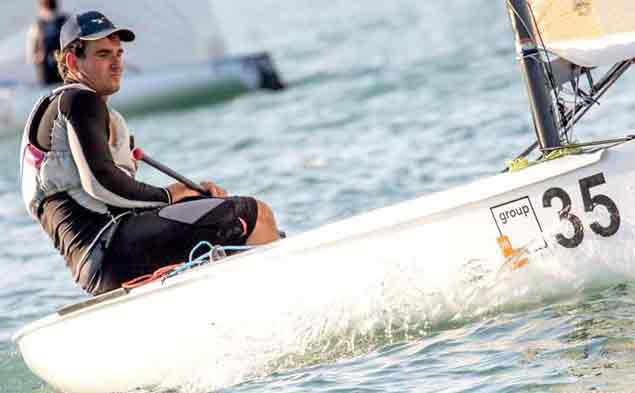 Baltimore's Fionn Lyden
Baltimore's Fionn Lyden
Epic Finn Euro Battles Relived on Finn TV
|
|
|
|
|
|
|
|
|
|
Oisin McClelland, Ireland's solo participant in the Finn European Championships, in Cádiz, Spain, finished 34th overall in his 91–boat fleet, a very satisfactory overall result, but a black flag disqualification in the final race on Friday will have been a disappointing conclusion for the Ulsterman in his bid for Tokyo 2020.
Ed Wright won his second Finn European title on Saturday, in Cádiz, after a spectacular medal race in high winds and huge waves that nearly resulted in the race being cancelled. Nicholas Heiner, from the Netherlands, had led all week, but several capsizes and a last place left him with the silver, while Max Salminen, from Sweden did enough to take the bronze, after placing second.
The Final Race for the rest of the fleet was cancelled with sustained gusts well over 30 knots and huge seas. This meant that Nils Theuninck, from Switzerland, won the U23 European title, from last year’s winner, Henry Wetherell, from Britain, and Ondrej Teply, from Czech Republic in third.
The medal race started with an average windspeed of 24 knots gusting to 29. With the huge waves it was on the limit, but the Finn sailors wouldn’t have it any other way. The race was on and they loved the extreme challenge of survival against the elements.
Results after medal race (medal race in brackets)
1 GBR 11 Edward Wright 57 (5)
2 NED 89 Nicholas Heiner 60 (9)
3 SWE 33 Max Salminen 71 (2)
4 NZL 24 Josh Junior 73 (1)
5 USA 6 Caleb Paine 73 (3)
6 GBR 91 Ben Cornish 92 (6)
7 BRA 109 Jorge Zarif 97 (DSQ)
8 CRO 1 Josip Olujic 99 (4)
9 FRA 112 Jonathan Lobert 101 (7)
10 GRE 77 Ioannis Mitakis 110 (8)
Full results here.



























